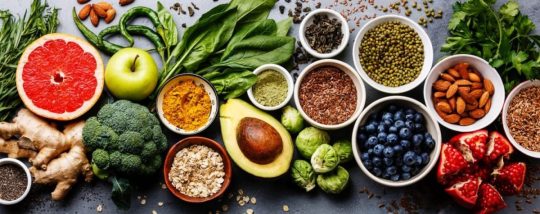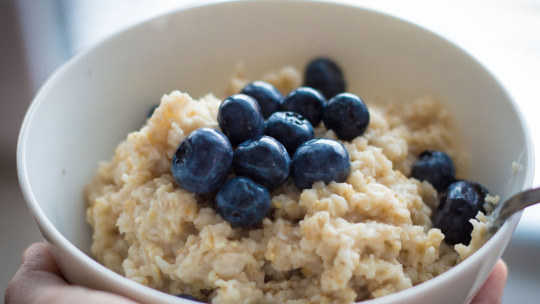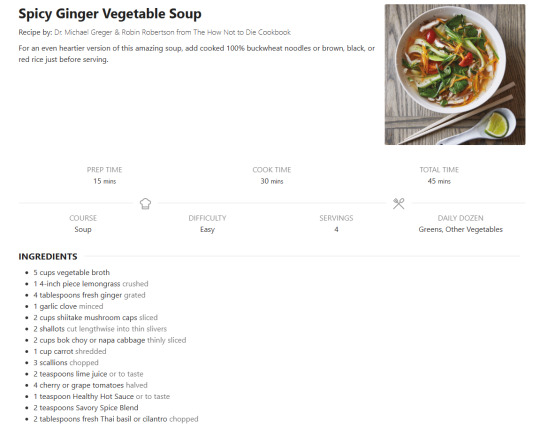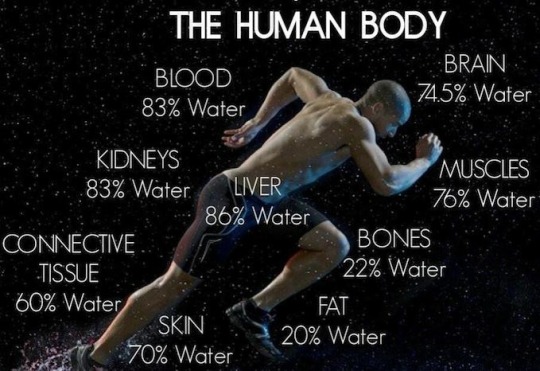#Dr. Michael Greger
Text
Human milk has the lowest protein content ever in any species ever tested. I mean, that's the fluid that's been designed by evolution over millions of years. So, it's like the perfect food for human babies. Right? Perfect food. Lowest protein content [than] any other mammal. And so, it gives us a sense of our protein requirements more than anything.
- Dr. Michael Greger in What the Health
#q#quotes#dr. michael greger#what the health#documentary#true nourishment#protein#nutrition#mindful consumerism#mindful living#holistic leveling up#leveling up#mindfulness#protein requirements#frugivore#wfpb#whole food plant based#plant based lifestyle#food centric herbalism#self healing#that girl#green juice girl#vegan#human milk#human nutrition#wellness journey#sidewalkchemistry
44 notes
·
View notes
Text
Video: How to Cultivate a Healthy Gut Microbiome with Food
Food for gut health: Our gut flora is determined by what we eat, for good or for ill. An unhealthy intestinal biome is a major contributor to heart disease and other illnesses.
—
Michael Herschel Greger (b. 1972) is an American physician, author, and professional speaker on public health issues, best known for his advocacy of a whole-food, plant-based diet, and his opposition to animal-derived…

View On WordPress
#aging#Animal rights#Dr. Michael Greger#gut bacteria#How to Cultivate a Healthy Gut Microbiome with Food#Illness#intestinal biome#TMAO#vegan#Vegan Kitchen#vegetarian
1 note
·
View note
Text
if anyone uses the daily dozen here, i jus realized that miso soup counts as a serving of beans. literally the best news ive heard all week
4 notes
·
View notes
Text
Debunking Myths and Celebrating Benefits: The Truth About Oats

I'm own a mission to unravel the mysteries surrounding one of nature's most beloved grains: oats. Amidst the swirling sea of nutritional misinformation, one question often arises: do oats truly chelate nutrients and minerals, robbing us of their health benefits? Join me as we dispel myths, celebrate the virtues of oats, and unveil the undeniable evidence of their safety and efficacy in promoting heart health.
First, let's address the elephant in the room: the notion that oats chelate nutrients and minerals, hindering their absorption in the body. While it's true that oats contain compounds called phytates, which can bind to minerals such as iron and zinc, the extent to which they impact absorption is minimal. In fact, studies have shown that the overall nutritional benefits of oats far outweigh any potential drawbacks, making them a safe and nutritious addition to a balanced diet.
Now, let's turn our attention to the remarkable cardiovascular benefits of oats—a topic near and dear to my heart as a naturopath. You see, oats are not just humble grains—they're nutritional powerhouses packed with heart-healthy nutrients such as beta-glucan, soluble fiber, and antioxidants. These compounds work in harmony to reduce cholesterol levels, lower blood pressure, and promote overall cardiovascular wellness.
But don't just take my word for it—let's delve into the science. Numerous studies have demonstrated the cholesterol-lowering effects of oats, particularly due to their high content of beta-glucan—a type of soluble fiber that forms a gel-like substance in the digestive tract, trapping cholesterol and carrying it out of the body. By incorporating oats into your daily diet, you can significantly reduce LDL cholesterol levels, thereby lowering your risk of heart disease and stroke.
But the benefits of oats extend far beyond cardiovascular health. From stabilizing blood sugar levels and promoting digestive health to boosting immunity and supporting weight management, oats are truly a nutritional powerhouse with a myriad of health-promoting properties. Whether enjoyed as a comforting bowl of oatmeal, blended into smoothies, or baked into wholesome treats, oats offer endless possibilities for nourishing both body and soul.
Let's celebrate the humble oat for the nutritional treasure that it is. Let's banish myths, embrace evidence-based science, and savor the delicious and healthful bounty of oats in all its forms. Whether you're seeking to reduce cholesterol, support heart health, or simply nourish your body with wholesome goodness, oats are here to fuel your journey towards optimal wellness. Check out this video for more information about oatmeal.
#nutrition#naturopathy#restoration wellness#healthy lifestyle#health and wellness#Dr Michael Greger#oats#benefits of oats#oats and heart disease#wellness
1 note
·
View note
Text

Spicy Ginger Vegetable Soup Recipe (nutritionfacts.org)
#plant based eating#vegan diet#spice ginger vegetable soup#soups and stews#how not to die cookbook#dr michael greger#eating healthy#stuff to try#singer#spicy#cabbage#scallions#lime juice#grape tomatoes#thai basil#lemongrass#vegetable broth#garlic#shallots#soba noodles
0 notes
Text
Plant-Based Benefits and Tips!
A couple of lovely people asked for some elaboration on plant-based eating! I studied nutrition & dietetics in college before I dropped out so I'm not a professional in nutrition but I do have a broad understanding of the biochemistry behind what we eat.
This is kind of a long post, so continue under the cut!
Starting with the basics!
I aim for a more whole foods plant-based diet, which is essentially a low-fat diet that focuses on removing all animal products, limiting processed food, and minimizing oils.
Looking at micronutrients, both protein and carbs have about 4 calories per gram, but oil has 9 calories per gram. Low-fat diets are often easier to manage calories on, as you can fill up on a higher volume of protein and carbs (specifically fiber) to reach satiety, whereas processed/high-fat foods are higher in calories per serving, meaning you get less volume.
You DO need fat in your diet, but it's preferable to reach for nuts, seeds, avocados, etc. instead of oil, which is comparatively nutritionally void.
FIBER IS YOUR BESTIE. Fruits, vegetables, and whole grains are low in calories meaning you can eat more of them, reaching satiety faster than you would with something processed. Fiber makes your digestive system happy. Be sure to incorporate more plants into your diet gradually so your digestive system can adjust.
Let's talk about animal products...
They are inflammatory by nature. If it comes from an animal, particularly red meat and ESPECIALLY processed meat, it will cause stomach issues in most people.
Fun fact, we are biologically closer to herbivores than carnivores. Our digestive tracts are much longer and our stomachs are less acidic than a carnivore's, meaning we are designed to most efficiently digest plant matter. Carnivores, on the other hand, have short digestive tracts and significantly more acidic stomachs for breaking down flesh and bone. This is why many people experience gastrointestinal discomfort when consuming meat. This leads to bloating, gas, and constipation. We are omnivores because we CAN consume animal products for survival, but it is nowhere near optimal.
Dairy is highly inflammatory and is directly linked to hormonal cancers (breast, prostate, etc.) It is also high in saturated fat, which is inflammatory. When we are born, we have the "gene" necessary to process breastmilk, but for many people, as we age, this "gene" gets switched off. Past infancy, we don't need milk (or other dairy products) because we can get our nutrients from other food sources. Black and Asian individuals have the highest rates of lactose intolerance. Not to mention, dairy is full of foreign bacteria, especially from factory farms, which causes an immune response in the body, leading to further inflammation.
Eggs are saturated fat and cholesterol bombs. They're high in protein, sure, but you can get protein and a wide variety of other nutrients from things like tofu.
To summarize, animal products are high in fat, high in cholesterol, high in calories, and cause inflammation, bloating, gas, and of course, constipation. Eating whole foods like vegetables, fruits, whole grains, beans/legumes, tofu, nuts, and seeds will boost your fiber intake, fill you with antioxidants, foster healthy gut bacteria, and reduce gastrointestinal issues.
Make sure you add more plants to your diet GRADUALLY. If you immediately go full force into eating plant-based, your stomach will experience distress due to the sudden increase in fiber, creating gas and bloating. But this will subside, and you'll feel better overall!
I highly recommend listening to seminars on YouTube by Dr. Neal Barnard, Dr. Michael Greger, Dr. Will Bulsiewicz, and Linda Davis RD to learn more in depth about what I've talked about.
Extra tips:
An air fryer is going to change your life when it comes to cooking without oil and making stuff taste good and have a better texture! I use mine multiple times a day.
TOFU!!! I'm a soy addicts, and tofu is my favorite source of protein. There's so many ways to prepare it, too!
Berries are so nutrient dense and delicious-- nature's candy!
There's honestly nothing wrong with protein powder even though it's processed. Just be sure to opt for vegan protein powder so you aren't loading your body with whey.
Stevia is a godlike sweetener, imo.
Eat a wide variety of different plants to diversify your gut microbiome and to get a variety of vitamins and minerals!
Take care of yourselves :') 💚🌿 I may add to this post as more things pop in my head!
When I tell you it's so goddamn easy to do dishes when you don't cook with oil 😭
Don't drink alcohol... this is the most hypocritical thing I can say lmao but it will wreak havoc on your gut microbiome
30 notes
·
View notes
Text

WATER IS LIFE~
"Your brain is almost 75% percent water. When you become dehydrated, your brain actually shrinks. Based on urine samples obtained from groups of nine to eleven-year-old kids in Los Angeles and Manhattan, nearly two-thirds of children may arrive at school in a state of mild dehydration, which may in turn negatively affect scholastic performance." Dr. Michael Greger
20 notes
·
View notes
Video
youtube
These 5 Vegetables Kill Cancer & Burn Fat️🔥 Dr. Michael Greger
5 notes
·
View notes
Text
youtube
Favorite Dr. Michael Greger - NutritionFacts.org Videos
Health Benefits of Non-Dutched Baking Cocoa Powder Without Sugar (Sweetened With a Healthy Alternative Sweetener), Without Milk… the Best of All Worlds. Chocolate and Artery Function: https://youtu.be/1-tfm9waeAE
#vegan #superfoods #chocolate #cocoa #cacao #MichaelGreger #NutritionFactsOrg
2 notes
·
View notes
Video
youtube
Join the Neuse River Witch for Positivi-Tea - a cuppa tea and a single card pull. Positivi-Tea: Insights for a Magical Day - Hurricane - September 5, 2024
Topics - Chaos, Destruction, Rebirth
Hurricane Matthew, Phoenix, Health and Wellness Dr. Michael Greger & Nutritionfacts.org
The Single Card Pull is a way to get started with your day. Take a deep breath and focus on the card. Listen to its references. See how those references fit into your world. What message can you take from this card and bring into your day? Pull that energy in and try to make this day the best it can be.
Blessings, Rev. Renee Sosanna Olson
Torchbearer & Keybearer - Covenant of Hekate
Founder - Sanctuary of Hecate Brimo
aka - Neuse River Witch This is deck, River Witch Oracle, is a look at the magic and symbolism of the rural southern United States. It pays homage and honors the life, blood and tears of those people whose sweat built this nation. It honors the indigenous people of the lands on which the Sanctuary of Hecate Brimo, the Catabwa and Lumbee Tribes as well as the unspeakable injustice, suffering and pain of African people, who were taken from their homes and enslaved to build this country. It looks to bring together and appreciate these cultures while looking directly in the face of these injustices with humility and reverence.
#confessionofamodernwitch #neuseriverwitch #pagan #magic #witchcraft https://www.tiktok.com/@neuseriverwitch https://www.instagram.com/neuseriverwitch/ https://www.facebook.com/neuseriverwitch https://www.youtube.com/@NeuseRiverWitch?sub_confirmation=1
0 notes
Text
The only other vitamin [of concern] is vitamin B12. It's not made by plants. It's not made by animals either. It's made by little microbes that blanket the earth. Because of the way we live in our sanitized world, unless you're eating bacteria-contaminated foods, we need to get a source of vitamin B12 from somewhere. So, the healthiest, cheapest, safest source is to get a vitamin B12 fortified food or vitamin B12 supplement — not to get it from meat and dairy...There's no vitamin, mineral, nutrient that you can't get from non-animal sources.
- Dr. Michael Greger in What the Health
#q#quotes#dr. michael greger#what the health#documentary#nutrition#wfpb#whole food plant based#plant based lifestyle#mindful consumption#mindful living#mindfulness#ethical consumption#frugivore#vitamin b12#vegan#that girl#green juice girl#holistic leveling up#leveling up#wellness journey#fitblr#food centric herbalism#true nourishment#sidewalkchemistry
2 notes
·
View notes
Note
what's the daily dozen?
It's a way of eating where you get a certain number of servings from a dozen different groups- beans, berries, other fruits, greens, cruciferous veggies, other veggies, nuts/seeds, flaxseeds, herbs / spices, whole grains. it's based on the book "how not to die" by dr. michael greger! anna akana made a video about it, which is how i found out abt this way of eating: https://m.youtube.com/watch?v=7lU7MlkNZuA
i've learned a lot about nutrition by eating like this, and i like it bc it's additive- i'm adding more servings of unprocessed food to my diet instead of banning certain foods. would recommend reading how not to die / watching anna's video
2 notes
·
View notes
Video
youtube
These 5 Supplements Kill Cancer & Burn Fat️🔥 Dr. Michael Greger
0 notes
Text
How Not to Die" by Dr. Michael Greger book summary
How Not to Die” by Dr. Michael Greger is a comprehensive guide to preventing and reversing chronic diseases through evidence-based nutrition and lifestyle changes. Here’s a summary of the key points:
Understanding the Leading Causes of Death: Greger identifies the top fifteen causes of premature death in the United States, including heart disease, cancer, stroke, diabetes, and respiratory…
View On WordPress
0 notes
Text

WATER IS LIFE!
"Your brain is almost 75% percent water. When you become dehydrated, your brain actually shrinks. Based on urine samples obtained from groups of nine to eleven-year-old kids in Los Angeles and Manhattan, nearly two-thirds of children may arrive at school in a state of mild dehydration, which may in turn negatively affect scholastic performance." Dr. Michael Greger
34 notes
·
View notes